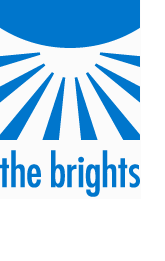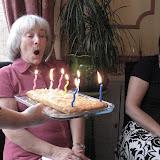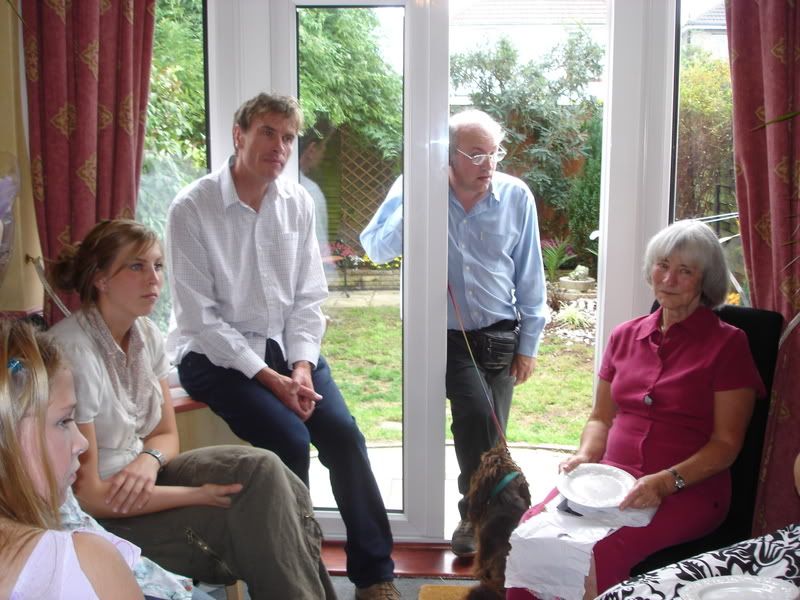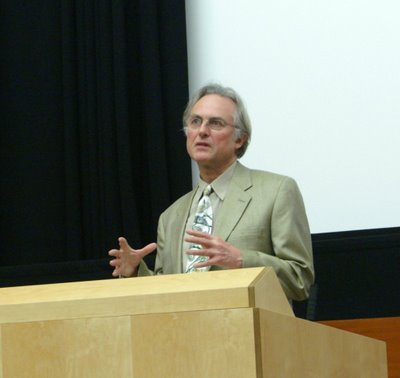
Mynga Futrell defined a bright to be "a person whose worldview is naturalistic—free of supernatural and mystical elements. A bright's ethics and actions are based on a naturalistic worldview."
So by this definition .... I am a Bright.
I first heard of this term from a Radio 4 talk with Daniel Dennett in 2006.
The brights movement was started by Paul Geisert and Mynga Futrell in 2003 to provide a positive-sounding umbrella term to describe various types of people who have a naturalistic worldview, without casting that worldview as a negative response to religion (as the terms "atheist", "infidel" or "non-believer" may be taken to do).
More information on The Brights:
Richard Dawkins wrote an article on Brights in Wired "Religion be damned" (edited)
"Like the word "Gay", bright is intended to come to the aid of another beleaguered community in the US: those who, in the most religiose country in the Western world, have no religion, who are variously labeled atheists, agnostics, freethinkers, philosophical naturalists, secularists, or humanists. I am a bright. You are (quite probably) a bright. Most of the people I know are brights. The majority of scientists are brights. Presumably there are lots of closet brights in Congress, but they dare not come out. Notice from these examples that the word is a noun, not an adjective. We brights are not claiming to be bright (meaning clever, intelligent), any more than gays claim to be gay (meaning joyful, carefree). Whether there is a statistical tendency for brights (noun) to be bright (adjective) is a matter for research. I would dearly like to see such research undertaken, and I know the result I am betting on, but it is no part of the definition of the noun. So, the bright meme is launched. Will it spread, like gay, and basically, and the backward baseball cap? Or will it nose-dive into the sand? I'm hoping it will take off. I'm even betting that it will, despite the hostility of those who misunderstand the humble noun as an arrogant adjective, and those who, notwithstanding the success of gay, resent all such coinings out of hand. But mostly, I am simply curious, as a disinterested scientist, to see what will happen."
Richard Dawkins in The Guardian
Language can help to shape the way we think about the world. Richard Dawkins welcomes an attempt to raise consciousness about atheism by co-opting a word with cheerful associations. Children are too young to know their religious opinions. Just as you can't vote until you are 18, you should be free to choose your own cosmology and ethics without society's impertinent presumption that you will automatically inherit your parents'. We'd be aghast to be told of a Leninist child or a neo-conservative child or a Hayekian monetarist child. So isn't it a kind of child abuse to speak of a Catholic child or a Protestant child? Especially in Northern Ireland and Glasgow where such labels, handed down over generations, have divided neighbourhoods for centuries and can even amount to a death warrant?
Catholic child? Flinch. Protestant child? Squirm. Muslim child? Shudder. Everybody's consciousness should be raised to this level. Occasionally a euphemism is needed, and I suggest "Child of Jewish (etc) parents". When you come down to it, that's all we are really talking about anyway. Just as the upside-down (northern hemisphere chauvinism again: flinch!) map from New Zealand raises consciousness about a geographical truth, children should hear themselves described not as "Christian children" but as "children of Christian parents". This in itself would raise their consciousness, empower them to make up their own minds and choose which religion, if any, they favour, rather than just assume that religion means "same beliefs as parents". I could well imagine that this linguistically coded freedom to choose might lead children to choose no religion at all.
Please go out and work at raising people's consciousness over the words they use to describe children. At a dinner party, say, if ever you hear a person speak of a school for Islamic children, or Catholic children (you can read such phrases daily in newspapers), pounce: "How dare you? You would never speak of a Tory child or a New Labour child, so how could you describe a child as Catholic (Islamic, Protestant etc)?" With luck, everybody at the dinner party, next time they hear one of those offensive phrases, will flinch, or at least notice and the meme will spread.
A triumph of consciousness-raising has been the homosexual hijacking of the word "gay". I used to mourn the loss of gay in (what I still think of as) its true sense. But on the bright side (wait for it) gay has inspired a new imitator, which is the climax of this article. Gay is succinct, uplifting, positive: an "up" word, where homosexual is a down word, and queer, faggot and pooftah are insults. Those of us who subscribe to no religion; those of us whose view of the universe is natural rather than supernatural; those of us who rejoice in the real and scorn the false comfort of the unreal, we need a word of our own, a word like "gay". You can say "I am an atheist" but at best it sounds stuffy (like "I am a homosexual") and at worst it inflames prejudice (like "I am a homosexual").
Paul Geisert and Mynga Futrell, of Sacramento, California, have set out to coin a new word, a new "gay". Like gay, it should be a noun hijacked from an adjective, with its original meaning changed but not too much. Like gay, it should be catchy: a potentially prolific meme. Like gay, it should be positive, warm, cheerful, bright.
Bright? Yes, bright. Bright is the word, the new noun. I am a bright. You are a bright. She is a bright. We are the brights. Isn't it about time you came out as a bright? Is he a bright? I can't imagine falling for a woman who was not a bright. The website http://www.celeb-atheists.com/ suggests numerous intellectuals and other famous people are brights. Brights constitute 60% of American scientists, and a stunning 93% of those scientists good enough to be elected to the elite National Academy of Sciences (equivalent to Fellows of the Royal Society) are brights. Look on the bright side: though at present they can't admit it and get elected, the US Congress must be full of closet brights. As with gays, the more brights come out, the easier it will be for yet more brights to do so. People reluctant to use the word atheist might be happy to come out as a bright.
Geisert and Futrell are very insistent that their word is a noun and must not be an adjective. "I am bright" sounds arrogant. "I am a bright" sounds too unfamiliar to be arrogant: it is puzzling, enigmatic, tantalising. It invites the question, "What on earth is a bright?" And then you're away: "A bright is a person whose world view is free of supernatural and mystical elements. The ethics and actions of a bright are based on a naturalistic world view."
"You mean a bright is an atheist?"
"Well, some brights are happy to call themselves atheists. Some brights call themselves agnostics. Some call themselves humanists, some free thinkers. But all brights have a world view that is free of supernaturalism and mysticism."
"Oh, I get it. It's a bit like 'gay'. So, what's the opposite of a bright? What would you call a religious person?"
"What would you suggest?"
Of course, even though we brights will scrupulously insist that our word is a noun, if it catches on it is likely to follow gay and eventually re-emerge as a new adjective. And when that happens, who knows, we may finally get a bright president.
The Brights website
The British Humanist Association and National Secular Society and The Brights are three societies promoting atheism in the UK. What are the differences?
The Brights
What is a bright?
- A bright is a person who has a naturalistic worldview
- A bright's worldview is free of supernatural and mystical elements
- The ethics and actions of a bright are based on a naturalistic worldview
Reason and Purpose
Currently the naturalistic worldview is insufficiently expressed within most cultures, even politically/socially repressed. To be a Bright (someone who fits the definition and registers on this Web site) is to participate in a movement to address the situation.
There is a great diversity of persons who have a naturalistic worldview. Some are members of existing organizations that foster a supernatural-free perspective. Far more individuals are not associated with any formal group or label. Under the broad umbrella of the naturalistic worldview, the constituency of Brights can undertake social and civic actions designed to influence a society otherwise permeated with supernaturalism.
The movement's three major aims are:
- Promote the civic understanding and acknowledgment of the naturalistic worldview, which is free of supernatural and mystical elements.
- Gain public recognition that persons who hold such a worldview can bring principled actions to bear on matters of civic importance.
- Educate society toward accepting the full and equitable civic participation of all such individuals.
The Brights — An international Internet constituency of individuals
Are You a Bright?
Think about your own worldview to decide if it is indeed free of supernatural or mystical deities, forces, and entities. If you decide that you fit the definition, then you can simply say so and join with us in this extraordinary effort to change the thinking of society—the Brights Movement.
Can the Brights impact society's outlook regarding the naturalistic worldview and the people who hold it? That remains to be seen, but if you are intrigued by the possibilities, you are invited to explore this Web site, learn more about the Brights Movement, and register as a Bright.
The Vision
Persons who have a naturalistic worldview should not be culturally stifled or civically marginalized due to society’s extensive supernaturalism. Rather, they ought to be accepted as fellow citizens and full participants in the cultural and political landscape.
This egalitarian vision is not the reality today. Moving toward it requires that individuals who do hold a naturalistic worldview make manifest their existence within society. The idea of materializing as Brights at the Internet hub of The Brights’ Net is to acquire visibility, fortify one another in what is a worthwhile outlook on the world, and grow a constituency that can join forces broadly to work on broad aims of social and civic action. Those who register into this Internet constituency have worldviews free of the supernatural deities, forces, and entities in which so many others believe. They stand for “a level playing field” that provides the same foothold in society as citizens who believe in the supernatural. The time is here to garner visibility and work for full social acceptance and civic participation.
The Brights’ Net has a set of guiding principles for association and action. While spreading the word about the constituency, the organization stands for these principles—as values, not dogma.
The generic noun form of bright is a tool to lay emphasis on the shared naturalistic worldview of a potentially large aggregate of persons. The term offers many individuals a means to step forward free of socially burdensome labels to speak more candidly and positively about their outlook.
Light!—clear and vivid! The imagery of brightness speaks to humanity’s impetus toward learning, audacity for open inquiry, and spirit of skepticism that once characterized an optimistic time on earth when science and reason seemed to offer the key to the future.
The authors of these selections write as individuals and offer depictions of the Bright movement somewhat at variance. Nevertheless, the material offers useful background and exemplifies some of the controversy over the noun, bright.
These concise questions and answers are a primer about the constituency of Brights, the Brights’ Network, and the overall Bright endeavor.
The idea of the noun bright as an umbrella term covering individuals with a naturalistic worldview is controversial. Here are some comments from individuals, followed by a bit of counter-commentary on our part.
First Thoughts
My first thoughts about The Brights are that they are without much local presence in Dorset / UK. They have not narrowed their definition down to ethical principles. Largely Internet based they are without much local presence in Dorset / UK
















